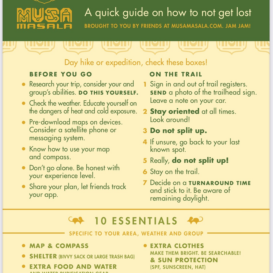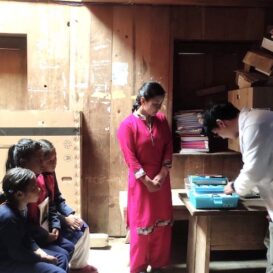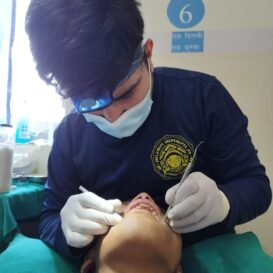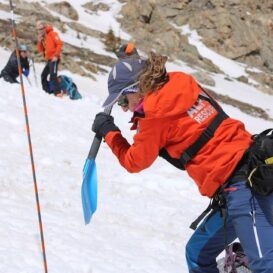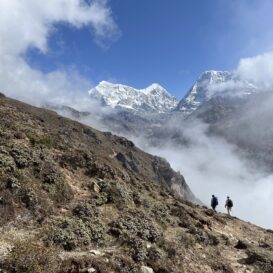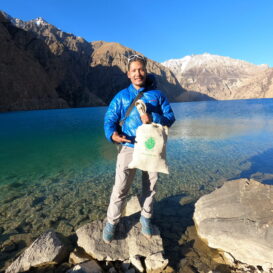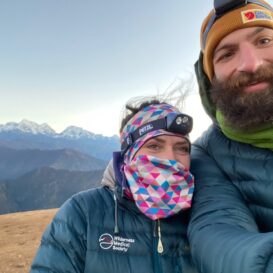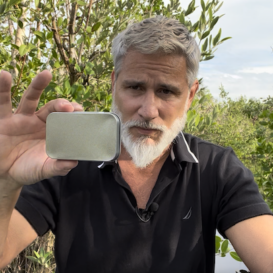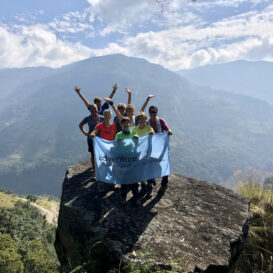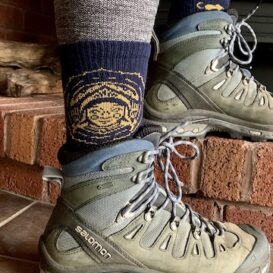Search and Rescue, SAR. What exactly is it? And who are these people who mostly volunteer to spend their free time looking for lost or injured people in the outdoors? Is there anything scarier than being lost, cold, hungry and tired? Well maybe a few things, like squirrels gnawing at your fingers. But aside from that, none of us want to be in a situation where we have to call for help. So let’s take some time this year to learn a bit about how to stay found in the wilderness, maybe not in an existential sense, but physically.
Let’s learn about what to bring and what to pack for different events and locations, weather and terrain, what to do if your gear breaks, and what to do if you do find yourself lost: who you gonna call?
We are launching something new at musamasala.com. Every other post for the first half of this year will be about staying found or getting found. We have an amazing group of experts from the wilderness medicine community, former military, SAR members, therapists and climbing guides here to share with you what they have learned, along with first hand accounts of people who have survived in tough situations around the world. Along the way we will share extra tips, quizzes and polls on related topics on on social media.
Let’s get started! Follow along (at a respectable distance) as we introduce Angela Widler, a Physician Assistant and SAR professional. We met Angela on the University of Colorado Patagonia Remote Medicine Expedition led by Dr. Martin Musi. Angela has been a friend of Musa Masala ever since. She is an awesome climber and one of the best people we know. She is going to be with us through this journey as we learn to take care of ourselves and others in the wilds. Jam Jam!!

Let’s define Search and Rescue. (Hint: It’s not an outdoors Uber.)
Search and Rescue (SAR) teams are groups of individuals who respond to calls for assistance in the wilderness setting. This can include calls for people who are lost, stranded, sick, injured or in some cases, deceased. Most teams are made up of “unpaid professionals,” or volunteers. This means that the majority of rescuers have day jobs and respond to calls as they are able. In some cases, such as National Parks or in the military, rescuers are paid for the service.
While most rescuers are volunteers, this is no way suggests lack of training or organization. The majority are highly trained individuals with organized response and interagency collaboration. Those who are part of the national Mountain Rescue Association (MRA) are required to uphold specific standards and demonstrate their skills and knowledge regularly. In addition, MRA teams never charge for their services.
The process for mobilizing SAR varies, but for most it starts with a 911 call. Once it is determined that SAR resources are required, a call will go out requesting available team members to respond. Services are available 24/7, rain or shine. SAR members will then stop what they are doing as able, gather their personal gear, and will hop into their personal vehicles to respond either directly to the scene, or to their headquarters where they may get into a team truck if available. A team response often requires a large number of responders and resources.
Depending on the location, it could take hours to get to the trailhead, and hours to get to the subject. In some remote areas there are no local rescue teams, and the drive alone could take half a day. While members will enter the field regardless of whether the conditions are favorable, they will not enter the field if the scene is determined to pose a life threat to rescuers. In some cases, injured or lost individuals may have to wait until conditions improve before they can be rescued which could be anywhere from hours to days.

The majority of injured subjects will be extricated by foot. If they cannot walk of their own accord, they will be strapped into a litter and rescuers will carry them out of the field. Even short distances can take extended periods of time depending on the terrain. While helicopters are an excellent resource and can be used for a variety of scenarios, they tend to be limited to when there is an imminent threat to life or limb as the act of flying itself is risky to the pilot, crew, and anyone else on board.
In addition, there are many instances where the weather conditions and terrain prevent helicopters from flying regardless of need. It is important to recognize that while SAR members are highly motivated to get to people who need help as soon as possible, searches and rescues take time. Rescue is not instantaneous nor is it guaranteed.
I joined Alpine Rescue Team in January of 2019. Joining Alpine is one of the best things I have ever done, and I am endlessly grateful for the opportunity to serve with such an amazing group of people. In Alpine I have found purpose, community, and inspiration. It is difficult to explain the comaraderie felt among the team and the desire to show up, not only for people who are having their worst day in the mountains but for your teammates. Our team usually holds trainings 6 times per month and has over 100 missions per year.
Both through the team and through relationships I have formed on the team, I have had the opportunity to learn and advance my skills in areas such as rock and ice climbing, mountaineering, technical rope rescue, avalanche partner and team rescue, navigation, in addition to continuing to expand my medical skills beyond the hospital and learning how to manage subjects in difficult terrain and situations with limited resources.
About Angela
Angela Widler is an unpaid professional search and rescuer in Colorado and a Physician Assistant with over nine years of experience in emergency medicine. She has recently transitioned to trauma and acute care surgery and is excited to expand her medical knowledge and skills. Angela is an avid learner and teacher of wilderness medicine, achieving her FAWM through the WMS, and cofounding the wilderness medicine interest group through the AAPA, as well as a website, The Society of Wilderness and Remote Medicine APPs, where those interested in wilderness medicine can access resources for training, volunteering, and work. She resides in Colorado where she takes full advantage of the mountain access and enjoys adventuring as often as possible. She has had her fair share of “whoopsies” from getting lost to unplanned overnight epics and considers herself a bit of a growing expert on what not to do!
Additional resources:
Facebook: facebook.com/AlpineRescue
Instagram: @alpinerescue
MRA website: mra.org
MRA facebook: facebook.com/MtnRescueAssoc
MRA Instagram: @mtnrescueassoc
SWARM website: wildernessmedapp.mypanetwork.com/

